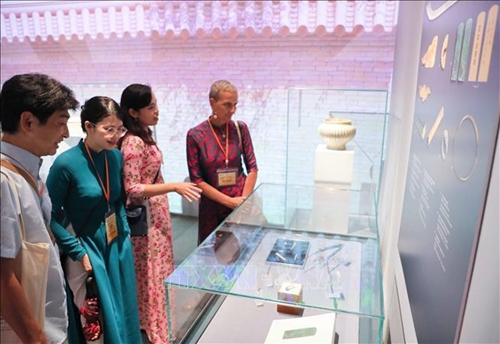September 09, 2022 | 16:11 (GMT+7)
Exhibition displays treasures of Thang Long Imperial Palace
Artefacts unearthed during a two-decade excavation of Thang Long Imperial Citadel are on display at an exhibition named “Treasures of Thang Long Imperial Palace.”
The exhibition was opened by the Thang Long - Hanoi Heritage Preservation Center on September 8 to mark the 50th anniversary of the Convention Concerning the Protection of the World Cultural and Natural Heritage (Convention 1972).
    |
 |
|
The exhibition attracts visitors. |
It comprises three zones, including one for artifacts from the Ly and Tran Dynasties and another for those from the Early Le, Mac, and Revival Le Dynasties.
Among the exhibits are various pieces of ceramics used as decoration inside the royal palace and those serving royal families both daily and on special occasions, such as festivals and Kings’ birthday and coronation ceremonies. There is a terra-cotta pot from Tran Dynasty, the largest of its kind ever found.
The event also introduces a number of precious metal artifacts, from jewelry, golden parts of utensils to royal swords and others.
The 3D mapping technology is deployed for the first time to provide visitors a clearer look at the uniquely beautiful patterns on the royal ceramics.
Recognized as a UNESCO World Heritage Site in 2010, Thang Long Imperial Citadel covers a total area of 18,353 ha. The archaeological excavations since 2002 here have unearthed millions of relics of various types from ceramics, chinaware, to metal objects.
Source: VNA